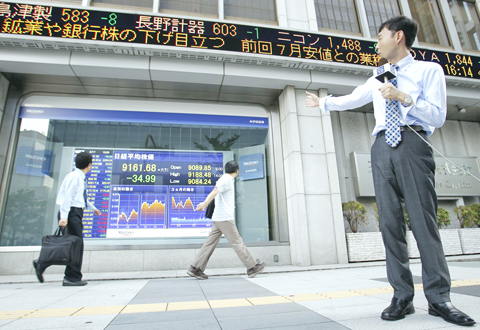Japan’s government will mull fresh stimulus steps ahead of an expected meeting between Japanese Prime Minister Naoto Kan and Bank of Japan (BOJ) Governor Masaaki Shirakawa, as persistent gains in the yen threaten a faltering recovery.
However, any stimulus is expected to be relatively minor and is likely to involve re-allocating funds rather than new spending.
The Nikkei Shimbun said the government’s stimulus steps might include extending the year-end deadline on subsidies for household purchases of energy-efficient consumer electronics.

PHOTO: REUTERS
The government will start to debate stimulus steps to shore up the economy on Friday, Japanese Economics Minister Satoshi Arai was quoted as saying by Jiji news agency yesterday.
The discussion will likely precede a meeting between Kan and Shirakawa, which a government source said is expected on Monday next week.
However, the meeting may be brought forward to this week, depending on market developments, said the source, who declined to be identified due to the sensitivity of the matter.
Kan and Shirakawa, who government sources had earlier said may meet this week, are expected to discuss the yen’s strength and possible responses, although likely options are seen as limited.
“As the government looks poised to come up with additional economic stimulus, the BOJ is likely to back this up by saying that it will persistently keep an easy policy and support growth areas with its new loan scheme,” said Junko Nishioka, chief economist at RBS Securities.
“Even if the BOJ does not take new initiatives, the Kan-Shirakawa meeting will effectively be a form of verbal intervention to halt the yen’s rise, as with last week’s remarks from the finance minister and Shirakawa,” Nishioka said.
Policymakers have tried hard to talk down the yen after it surged to a 15-year high against the US dollar last week, adding to their headaches as they grapple with deflation and slowing growth in major export destinations such as the US and China.
Arai said the yen’s rise might not be stopped just by verbal intervention, Kyodo news agency reported, just as the yen remained within sight of its 15-year high against the dollar.
Kan has said the yen’s sudden rise against the dollar had become a concern and he would continue to watch it carefully, but has given few clues on whether and when he will meet Shirakawa.
The BOJ is worried about the impact the strong yen could have on business sentiment, but is likely to stand pat, unless the dollar falls at a pace of ¥2 to ¥3 in a single day and heads toward its all-time low below ¥8. The dollar is now hovering around ¥85.30.

MORE VISITORS: The Tourism Administration said that it is seeing positive prospects in its efforts to expand the tourism market in North America and Europe Taiwan has been ranked as the cheapest place in the world to travel to this year, based on a list recommended by NerdWallet. The San Francisco-based personal finance company said that Taiwan topped the list of 16 nations it chose for budget travelers because US tourists do not need visas and travelers can easily have a good meal for less than US$10. A bus ride in Taipei costs just under US$0.50, while subway rides start at US$0.60, the firm said, adding that public transportation in Taiwan is easy to navigate. The firm also called Taiwan a “food lover’s paradise,” citing inexpensive breakfast stalls

TRADE: A mandatory declaration of origin for manufactured goods bound for the US is to take effect on May 7 to block China from exploiting Taiwan’s trade channels All products manufactured in Taiwan and exported to the US must include a signed declaration of origin starting on May 7, the Bureau of Foreign Trade announced yesterday. US President Donald Trump on April 2 imposed a 32 percent tariff on imports from Taiwan, but one week later announced a 90-day pause on its implementation. However, a universal 10 percent tariff was immediately applied to most imports from around the world. On April 12, the Trump administration further exempted computers, smartphones and semiconductors from the new tariffs. In response, President William Lai’s (賴清德) administration has introduced a series of countermeasures to support affected

CROSS-STRAIT: The vast majority of Taiwanese support maintaining the ‘status quo,’ while concern is rising about Beijing’s influence operations More than eight out of 10 Taiwanese reject Beijing’s “one country, two systems” framework for cross-strait relations, according to a survey released by the Mainland Affairs Council (MAC) on Thursday. The MAC’s latest quarterly survey found that 84.4 percent of respondents opposed Beijing’s “one country, two systems” formula for handling cross-strait relations — a figure consistent with past polling. Over the past three years, opposition to the framework has remained high, ranging from a low of 83.6 percent in April 2023 to a peak of 89.6 percent in April last year. In the most recent poll, 82.5 percent also rejected China’s

PLUGGING HOLES: The amendments would bring the legislation in line with systems found in other countries such as Japan and the US, Legislator Chen Kuan-ting said Democratic Progressive Party (DPP) Legislator Chen Kuan-ting (陳冠廷) has proposed amending national security legislation amid a spate of espionage cases. Potential gaps in security vetting procedures for personnel with access to sensitive information prompted him to propose the amendments, which would introduce changes to Article 14 of the Classified National Security Information Protection Act (國家機密保護法), Chen said yesterday. The proposal, which aims to enhance interagency vetting procedures and reduce the risk of classified information leaks, would establish a comprehensive security clearance system in Taiwan, he said. The amendment would require character and loyalty checks for civil servants and intelligence personnel prior to